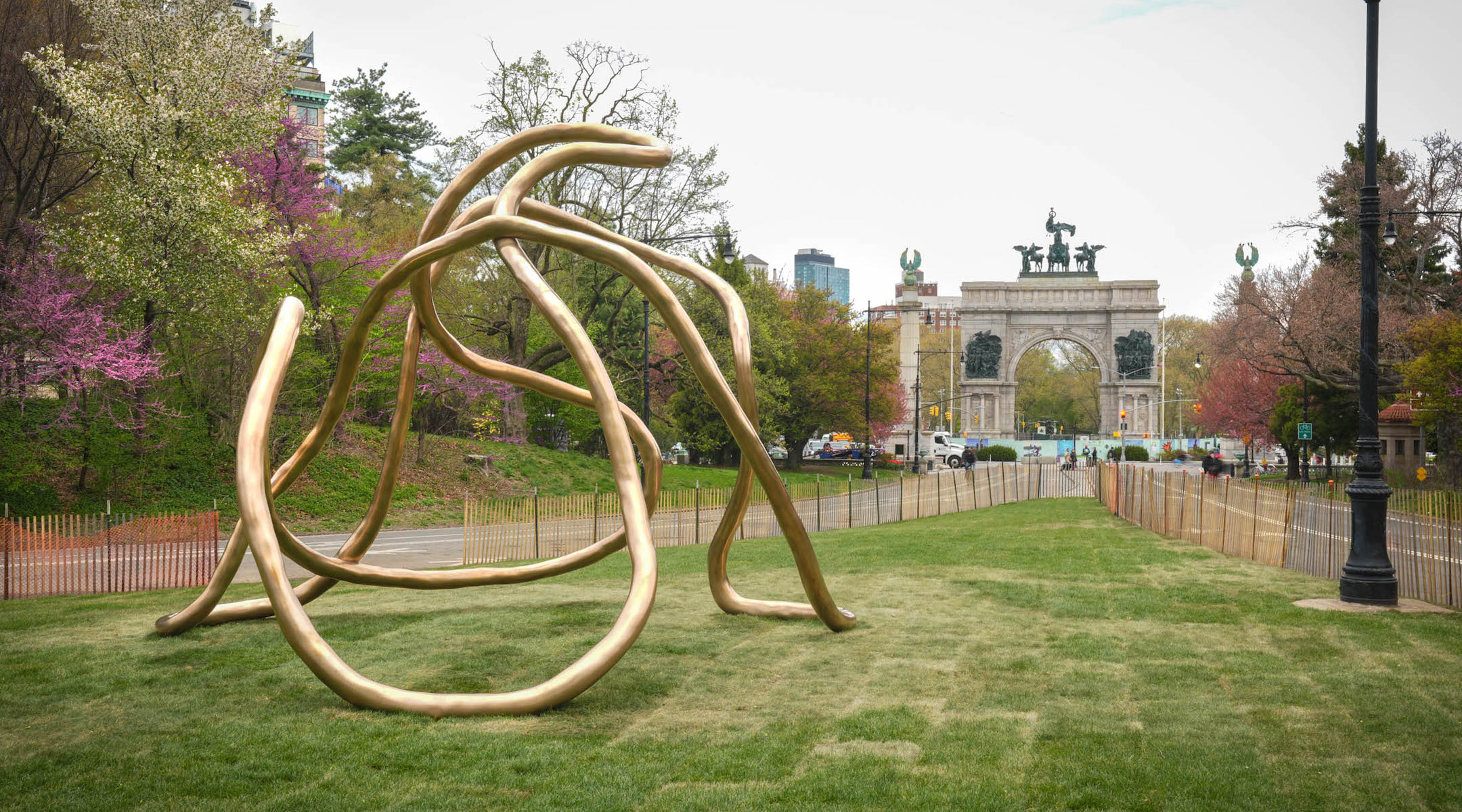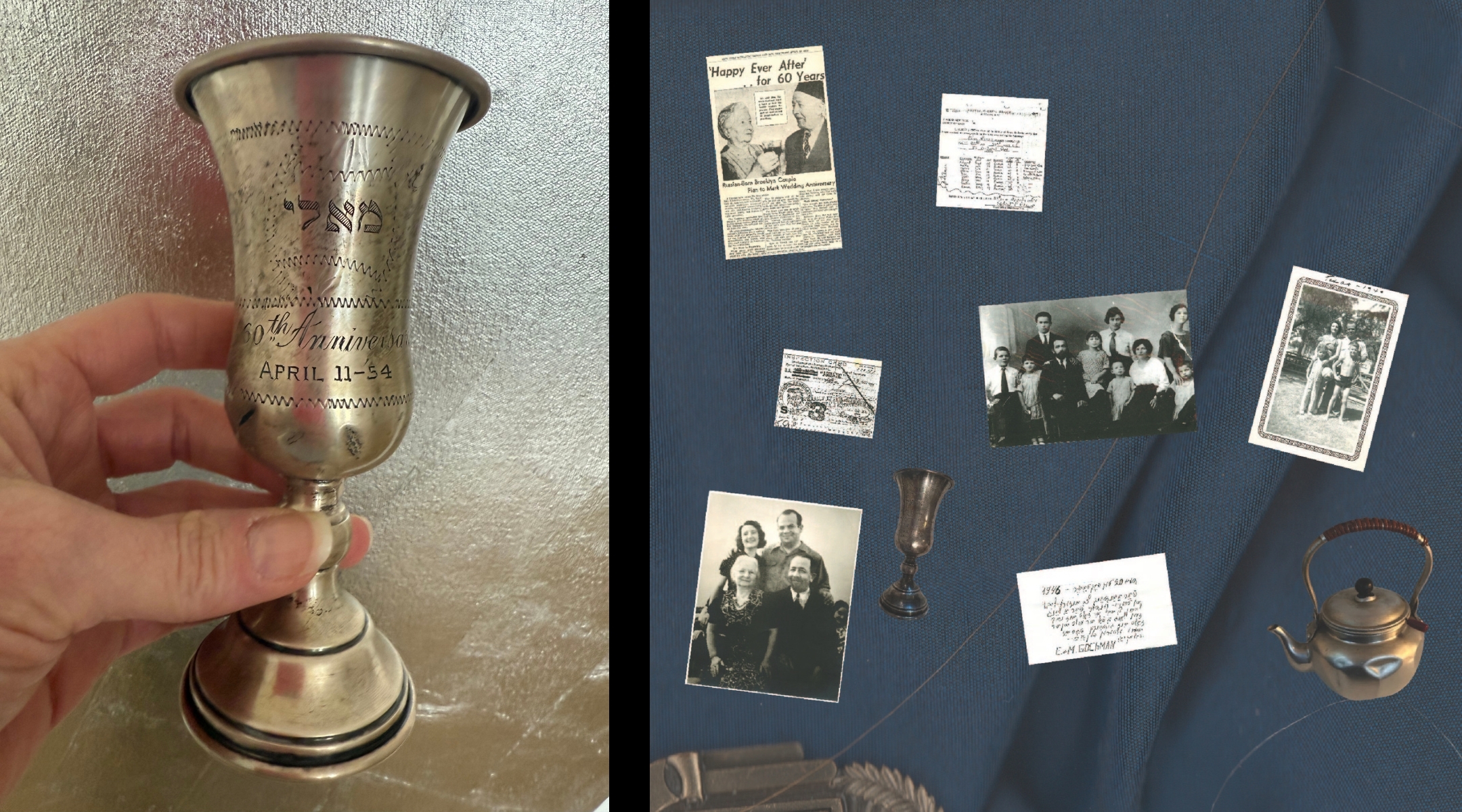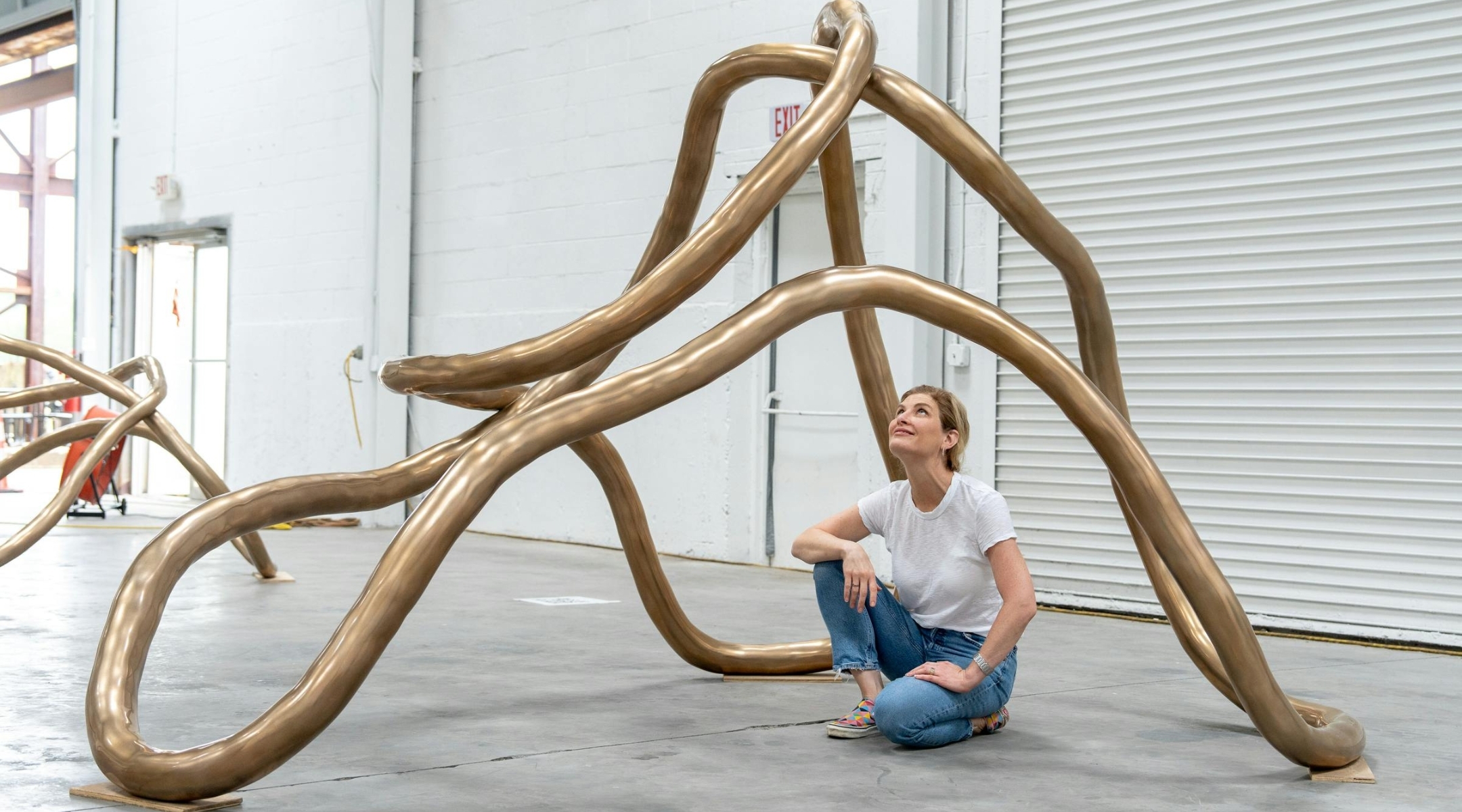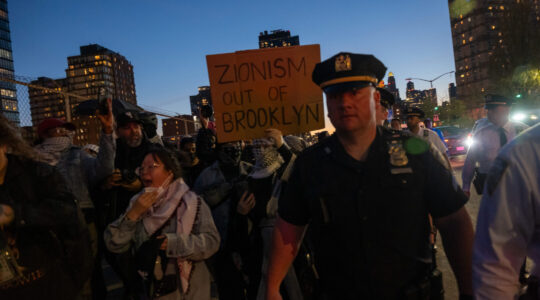A new abstract bronze sculpture that celebrates motherhood and caregiving was unveiled in Brooklyn’s Prospect Park last week.
Created by Jewish artist and activist Molly Gochman, the sculpture, part of her “Monuments to Motherhood” series, is 15 feet tall and resembles a loosely tied knot. It stands just opposite Grand Army Plaza, whose most notable feature is the Soldiers and Sailors Arch, which was built between 1889 and 1892 to honor Civil War Veterans.
Gochman’s sculpture, by contrast, is designed to subvert monuments that glorify violence and battlefield victories.
“What I’m trying to do is monumentalize the act of care,” Gochman told the New York Jewish Week in a recent phone interview.
The artist added that her sculpture is designed to “invite people to think of mothering in a more expansive way, like how we mother the earth, how we mother each other,” Gochman said. “I wasn’t thinking of one caregiver, specifically, I was thinking of this act of care.”
Gochman, 47, grew up in San Antonio, and is the daughter of antitrust and civil rights lawyer Arthur Gochman. The elder Gochman, who died in 2010 at age 79, was also the founder of an extremely successful sporting goods chain in Texas, Academy Sports.
Molly Gochman — whose work has been shown at the Ukrainian Museum in New York, and included in group exhibitions at Lincoln Center — moved to New York in 2012. Aside from a stint in Fort Greene, Brooklyn, she’s mostly lived in downtown Manhattan. In addition to creating art, Gochman serves as board chair for the Freedom Fund, a nonprofit working to end modern slavery, and is also on the Brooklyn Museum’s Council for Feminist Art and the New Museum’s Artemis Council.

Molly Gochman’s “Monuments to Motherhod” sculpture will be in Prospect Park through May 2026 (Alex Mctigue/Courtesy of Molly Gochman)
Gochman’s latest work, which will be on view at Prospect Park through May 2026, is inspired by both her experience as a mother and her Jewish identity. “I wasn’t raised religious, but I was raised with Jewish values,” Gochman said.
“The fifth commandment is to honor thy mother and father, and the Torah says three times that children should honor and care for their parents,” Gochman added. “And I think care is fundamental to Judaism and the Jewish tradition, and caregiving is a Jewish value that we can all identify with.”
A married mother of two children, ages 9 and 5, Gochman recognizes how motherhood has transformed many aspects of her life, including her perception of joy and the passage of time.
“As a mother, also, a lot of what you do, you just do for others,” she said. “But remembering that I needed to do something for myself, and creating this work was something I did for myself and modeling also for my kids, that it’s okay to do something for yourself.”
“I was thinking of the emotions I have and the gestures that I perform when I’m caring for others, which are often like cooking and cleaning and holding,” Gochman said about her process creating the sculpture. “And so, the two loops that come together support one another. Neither can stand alone, and when I look at them, it reminds me of when my children’s limbs might flop over me when we’re cuddling at night.”
Gochman also cites her late father as inspiration: As a lawyer, Arthur Gochman was perhaps best known for his involvement in the 1973 civil rights case San Antonio Independent School District v. Rodriguez, which challenged the way Texas public schools were financed by local property taxes. Ultimately, the U.S. Supreme Court decided that the state’s funding system was not a violation of the Fourteenth Amendment.
“It would have changed how we fund public education in this country,” Gochman said, looking back at what could have been different. “And realizing that we fail a lot, but even the failures are things we learn from. Jane Fonda says something about being young and thinking life was a sprint, getting older, thinking it was a marathon — and I’m now realizing it’s a relay race, just carrying batons and knowing that I’m not going to reach the finish line.”
To that end, another of Gochman’s “Monuments to Motherhood” sculptures is currently on view in Memphis, and Gochman also runs a podcast by the same name. “The podcast allows me to talk with different people about how they practice caregiving,” she said. “I talked to a man who takes care of his dad. I talked to two trans activists who are house mothers. So I’m trying to expand the definition of monuments and motherhood so that people can monumentalize an idea or an act.”
Gochman’s other recent public installation projects include a 650-foot trench filled with red sand at the Houston airport, representing the restriction on freedom of movement at the United States-Mexico border, and a sculpture resembling a scar, representing Russian aggression in the war in Ukraine, that was on display in Asser Levy Park, Brighton Beach, a Brooklyn neighborhood with a large community from the former Soviet Union.
She has also mined her own family’s history through a multimedia project called “Memory Collage,” which includes family photos and a kiddush cup commemorating her great-grandparents’ 60th wedding anniversary.

A section from Jewish artist and activist Molly Gochman’s ‘Memory Collage’ project detailing her family’s history. (Courtesy Molly Gochman)
Though Gochman designed “Monuments to Motherhood” with a few interpretations in mind, she also hopes that people who pass by it make their own meaning out of it.
While installing the piece in Brooklyn, Gochman said a runner yelled out to her that he instinctively knew it was “about connection.” She hopes it can also be used as a meeting point, and an interactive piece. As such, a public Mother’s Day celebration with family-friendly activities at the sculpture is scheduled for Sunday, May 11. (The sculpture is meant to be touched, and will become patinated over time from rain and oxygen, and as the oils from visitors’ hands interact with the bronze, turning it a greenish-blue.)
“I think of it as looking like a hug when you enter Prospect Park,” Gochman said. “And hopefully when people enter, they feel embraced and welcome and feel like not only is Prospect Park your park, but this is your sculpture.”
The New York Jewish Week brings you the stories behind the headlines, keeping you connected to Jewish life in New York. Help sustain the reporting you trust by donating today.




